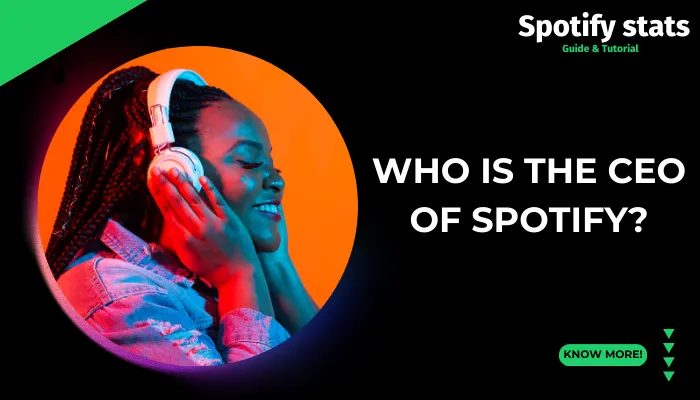As you scroll through the music on Spotify, have you ever wondered who is the CEO of Spotify? who made it possible to have all these genres at your fingertips? Stop wondering. Daniel Ek, is the man behind Spotify which is world’s leading music streaming service.
But Daniel Ek’s story as a CEO goes beyond that. He is a tech entrepreneur who changed how we listen to music. Now put in those earphones and shuffle your favorite Spotify playlist as we delve into the life of Daniel Ek and his influence in music.

Look at Daniel Ek’s Early Career
Long before Spotify’s iconic green logo graced our screens, Stockholm teenager Daniel Ek who is the CEO of Spotify used to create websites. However, it did not end with the tech whiz kid who had an entrepreneurial spirit he started businesses with others, developed his coding skills and imagined a situation where music could be transformed legally.
Humble Beginnings in Stockholm (1983 – 2002)
This takes us back to 1983 when he was born and raised in Stockholm, Sweden. However, unlike most of his fellow industry titans, Ek did not grow up with a silver spoon in his mouth. Little is known about his early years though it is common knowledge that hard work does not shy him away.
In fact, at only 16 years old, he showed business acumen by establishing his own web development company! This experience not only honed his technical abilities but also kindled his interest in technology and its potential for changing the world.
Launching into the Tech World (2002 – 2006)
By this time, Daniel Ek was already making waves within Sweden’s tech community at just over twenty years old. Among other things, this involved co-creating Stardoll – an incredibly popular virtual dollhouse game aimed primarily at young girls.
This accomplishment cemented further his position as an authority in this field while also providing valuable lessons on developing successful online platforms from scratch and scaling them up.
However, what really preoccupied him were virtual dolls because, according to him, there was something bigger wrong with the music industry – piracy. There were countless numbers of people downloading songs illegally which led to huge losses for artists and record labels.
Daniel Ek who is the CEO of Spotify believed that there should be a legal and convenient alternative that could benefit both music lovers in general and the industry as a whole. This idea was what he believed would change the world forever.
That led to Spotify, Ek’s next big thing – one that transformed music.
Rise of Music Streaming with Birth of Spotify
In 2006, Daniel Ek who is the CEO of Spotify and his business associate Martin Lorentzon were busy trying to turn around the music industry. They created Spotify; a music streaming service. It was simple but revolutionary: pay a monthly fee for unlimited access to almost every legally recorded song ever made. Users could create playlists, discover new artists, and listen to their favorite tracks from any device anywhere on earth.
However, starting Spotify was not smooth, especially when they had to convince record companies and raise funds. Even then, Ek never gave up. He simply believed so much in his idea of how people should consume music differently.
Leading the Music Streaming Revolution
Once upon a time, the music industry was shaking in its boots due to piracy. Then along came a Swedish company called Spotify which presented an entirely fresh way out: almost infinite music collection for all and sundry at the proper price. It was this that caused the era of streaming music and changed how we listen to it forever. Come with me into Spotify’s story and how it became king of this digital musical revolution.
From Humble Beginnings To Global Phenomenon
Spotify went global in 2008 where everyone became aware of its existence. For this reason, people who liked music worldwide converged on this platform due to its convenience and an extensive library. Within years, it demonstrated that technology could progress by going beyond Europe resulting in over 615 million Monthly Active Users (MAU) at some point (as of March 2024), with an incredible figure of 239 million paying subscribers!
Spotify’s strong growth:
| Year | Monthly Active Users (MAU) | Paying Subscribers |
|---|---|---|
| 2008 | 1 Million | N/A |
| 2012 | 40 Million | 5 Million |
| 2016 | 150 Million | 50 Million |
| 2020 | 345 Million | 155 Million |
| March 2024 | 615 Million | 239 Million |
The fact that Spotify has revolutionized the music industry is no secret. It eradicated piracy through legal means which led to resurgence in fortunes for the music industry.
This gave artists new streams of revenue as they now earn royalties for streaming songs. In addition, Spotify’s personalized recommendations and curated playlists have brought their favorite artist songs closer to them.
Spotify’s Strategy for Diversification
While it continues to be a primary focus for Spotify, music streaming alone cannot be the end of it but rather they need to look further for more growth areas. Such include:
- Podcasts: As mentioned before, Spotify is big on Podcasting. These bring along more content and users as well as wider audience and monetization opportunities for creators in this case.
- Audiobooks: Based on their audio expertise, Spotify entered into the Audiobook industry where people can enjoy moving experiences while listening to their preferred books. This caters to the rise in audiobooks demands hence making them an all-round entertainment platform.
- Live Events: Spotify has begun to experiment with the possibility of live events, recognizing their power. Partnerships with artists and venues allow premium subscribers exclusive access to live performances such as concerts. This is how they develop a differentiated value proposition for paying users and strengthen fan-artist relationships.
This implies that Spotify is not just a music-streaming company but an audio entertainment hub that caters to diverse preferences of different people, hence enabling it to create new sources of revenue.
Future of Spotify under Daniel Ek
The landscape for music streaming is dynamic and constantly evolving, so Spotify will have to deal with new challenges and opportunities over the next few years. Here are some examples:
- Artificial Intelligence (AI): AI plays a major role in personalizing user experience by suggesting new music or podcasts through creating custom playlists based on individuals’ interests. Notably, AI development is one area where Spotify will invest heavily in order to maintain its lead.
- Rise of Voice Assistants: For better customer interaction, it will be important to seamlessly integrate Spotify into platforms like Alexa and Google Assistant since these voice assistants are becoming more commonplace.
- Battle for Content: Exclusive deals with artists and podcast creators for unique content will continue being the main battleground among music streamers. Therefore, the company needs to think strategically about how they acquire contents in order to sustain its competitiveness.
Conclusion
Now you know who is the CEO of Spotify. Daniel Ek whose rise from a Stockholm programmer to music mogul is an example of innovation and influence. Through his leadership, we can say that Spotify has changed the way we get involved in music.
However, with a concentration on customers’ demands and being dynamic all the time, Spotify is set to remain at pace with regards to the ever-changing audio entertainment scenarios. When you hit play next time remember this guy behind the microphone – Daniel Ek.
